|
|
|
Sort Order |
|
|
|
Items / Page
|
|
|
|
|
|
|
| Srl | Item |
| 1 |
ID:
125139
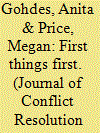

|
|
|
|
|
| Publication |
2013.
|
| Summary/Abstract |
We address weaknesses in the Peace Research Insitute Oslo (PRIO) Battle Deaths Dataset, and as a result draw contradicting conclusions to those presented by Lacina and Gleditsch. Our analysis focuses on the availability of data on battle deaths within specific conflict-years and problems encountered when data from multiple types of sources are combined. We repeat Lacina, Gleditsch, and Russett's analysis of battle deaths over time, with an attempt to provide a more robust model and incorporate an estimate of the uncertainty present in the PRIO Battle Deaths Dataset. This reanalysis reveals that the data used to establish the PRIO Battle Deaths Dataset does not offer a clear answer as to whether battle deaths have decreased or increased since the end of the Second World War. We contend that while the PRIO Battle Deaths Dataset offers the most comprehensive assembly of battle deaths data available to date, it is not suitable for analysis across countries or over time.
|
|
|
|
|
|
|
|
|
|
|
|
|
|
|
|
| 2 |
ID:
125105
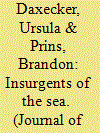

|
|
|
|
|
| Publication |
2013.
|
| Summary/Abstract |
While piracy may evoke romanticized visions of swashbuckling, rum swigging, and skirt chasing pirates hoisting the Jolly Roger, maritime piracy has changed substantially by taking advantage of modernization and substantial upgrading of the weapons, vessels, and weapons it employs. In addition, as documented by the International Maritime Bureau (IMB), the frequency of pirate attacks has increased significantly, with more than 2,600 piracy incidents occurring since 2004. The authors argue that piracy is a result of permissive institutional environments and the lack of legal forms of employment in states' fishing sectors. The authors investigate these arguments empirically using data for all countries with coastlines in the 1995-2007 period. The empirical analyses show that state weakness and reductions in fisheries production values affect piracy as expected. These findings suggest that international efforts in combating piracy should center on improving the institutional environments and labor opportunities driving maritime piracy.
|
|
|
|
|
|
|
|
|
|
|
|
|
|
|
|
| 3 |
ID:
125134
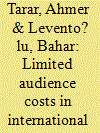

|
|
|
|
|
| Publication |
2013.
|
| Summary/Abstract |
Do audience costs have to be extremely large in order to credibly signal resolve and affect international crises? Existing theoretical work on audience costs suggests an affirmative answer, and recent empirical work on audience costs focuses on whether a leader can generate such large audience costs as to create a commitment to fight where no such commitment previously existed. We analyze a richer crisis bargaining model with audience costs and find that (1) audience costs can have war-reducing effects on incomplete-information crisis bargaining through a noninformative, bargaining-leverage mechanism and (2) audience costs can have war-reducing effects even when such large audience costs are not being generated as to create a commitment to fight where no such commitment previously existed. Even more limited audience costs can have war-reducing effects in international crises. We discuss how the bargaining-leverage mechanism is consistent with a number of prominent historical cases
|
|
|
|
|
|
|
|
|
|
|
|
|
|
|
|
| 4 |
ID:
125131


|
|
|
|
|
| Publication |
2013.
|
| Summary/Abstract |
Political scientists tend to focus on environmental triggers as the primary precipitating cause for political violence. However, little has been done to explain why certain individuals faced with certain pressures resort to violence, while others confronting the same situation seek out diplomatic and peaceful resolutions to conflict. Here, using two independent samples, we explore the interaction between genetic disposition and violent early life events and their influence on engaging in physical violence. We find that individuals with the low-activity form of monoamine oxidase-A, who are exposed to violence in youth have a greater likelihood of engaging in physical aggression later in adulthood. Our findings hold important implications for the value of environmental intervention in communities besieged by political violence in order to reduce the likelihood of the intergenerational transfer of its propensity
|
|
|
|
|
|
|
|
|
|
|
|
|
|
|
|
| 5 |
ID:
125112


|
|
|
|
|
| Publication |
2013.
|
| Summary/Abstract |
Using a simulated bilateral negotiation over several security issues, the authors explore how variations in the negotiation context influence reactions to a negotiating crisis. Negotiators were primed to focus on one of three aspects of the context: transaction costs, dependence, or shared identity. They were asked to respond to the crisis with a decision to reach an immediate agreement, continue negotiating, or reframe the issues. The results showed that mutual dependence (unattractive alternatives) led to reframing (turning points) whereas high transaction costs led to a preference for continuing the negotiation. Shared identity did not affect negotiators preference across alternative courses of action. Affective trust amplified the impact of dependence and transaction costs: the decision to reframe was made more often by negotiators who reported low affective trust, whereas the decision to reach immediate agreement was made more often by negotiators who reported high affective trust. High cognitive trust encouraged negotiators to continue the negotiation if they had a shared identity or if transaction costs were high. Applications were made to real-world cases and implications were developed for Relational Order theory and for further research.
|
|
|
|
|
|
|
|
|
|
|
|
|
|
|
|
| 6 |
ID:
125116
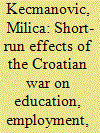

|
|
|
|
|
| Publication |
2013.
|
| Summary/Abstract |
The recent war in Croatia (1991-1995) has had numerous adverse affects on the country and the economy as a whole. This article investigates the effect that the war had on the educational, employment, and earnings trajectories of the 1971 birth cohort of men. This birth cohort was very likely to be drafted into the armed forces. Using data from the Croatian and Slovenian Labour Force Surveys, the author treats the occurrence of the war as a natural experiment and applies the difference-in-difference framework to compare this cohort to adjacent cohorts, women, and respective cohorts in Slovenia, a neighboring country that did not experience war. The war appears to have had a negative effect on educational outcomes but a small positive effect on employment and earnings outcomes of this cohort of men. Croatia's victory in the war may provide an explanation for the observed preferential treatment of draftees in the labor market.
|
|
|
|
|
|
|
|
|
|
|
|
|
|
|
|
| 7 |
ID:
125121
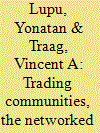

|
|
|
|
|
| Publication |
2013.
|
| Summary/Abstract |
The authors argue that theories regarding the relationship between trade and conflict could benefit greatly from accounting for the networked structure of international trade. Indirect trade relations reduce the probability of conflict by creating (1) opportunity costs of conflict beyond those reflected by direct trade ties and (2) negative externalities for the potential combatants' trading partners, giving them an incentive to prevent the conflict. Trade flows create groups of states with relatively dense trade ties, which we call trading communities. Within these groups, the interruptions to trade caused by conflict create relatively large costs. As a result, joint members of trading communities are less likely to go to war; however little they directly trade with each other. The authors systematically measure and define trading communities across various levels of aggregation using the network analytic tool of modularity maximization. The authors find significant support for their hypothesis, indicating that interdependence theory can be extended to extra-dyadic relations.
|
|
|
|
|
|
|
|
|
|
|
|
|
|
|
|
| 8 |
ID:
125145
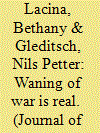

|
|
|
|
|
| Publication |
2013.
|
| Summary/Abstract |
A number of recent studies argue that there is decline in armed conflict within and between nations. Gohdes and Price run against the grain in arguing that there is no evidence for a decrease in battle deaths in armed conflicts after World War II and that the trend reported in our earlier articles is spurious. However, they do not plausibly justify this thesis. We reexamine the argument for a decline, exploring nonlinearities in the data and potential biases due to measurement error. We find that very strong assumptions must hold in order for measurement errors to explain the trend in battle deaths.
|
|
|
|
|
|
|
|
|
|
|
|
|
|
|
|
|
|
|
|
|